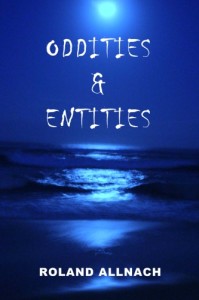Pathos and Purpose: Crafting Bizarre Characters
by
Roland Allnach
One of the challenges faced by authors is the credible depiction of characters that stand outside the everyday norm. So, how does an author construct an abnormal character?
The sarcastic answer is that the author is a little off-center. But, aside from that, crafting an abnormal character isn’t much different than crafting a so-called normal character. Characters are people at their core, and to depict them requires fleshing out the thoughts, sensitivities, and motivations of their personalities. A theory of neurology is that the human mind evolved as a problem solving organ. As such, it functions on logic structures that make sense of the world and its dizzying array of sensory input. In many ways, society can be viewed as a mutually agreed interpretation of the world by a given people. Religious organizations, basic morality, and societal law are all extensions of our quest to reduce the chaos of the world to predictable outcomes and acceptable explanations of the unknown. Just as a society projects these interpretations, it is turn bound by the mutual belief in these interpretations.
With this in mind, the prospect of an abnormal character can be more readily understood. People who suffer from paranoia and delusion often construct elaborate alternate interpretations of the world around them, interpretations that differ from the societal standard. Nevertheless, such individuals can provide reason and context to their actions and beliefs. They have a logical structure, concocted to satisfy the individual’s skewed interpretation of the common world. For outsiders, judgments of deviant, madness, sociopath and psychopath can then be thought of as relativistic labels.
To the abnormal individual, on the other hand, nothing is seen as amiss. This person has constructed a unique system and from it derived a set of sensitivities, thoughts, and motivations. For both an author and a reader, the process of revealing this three-fold set is what lends substance to an abnormal individual. A window of introspection, a brief analysis of the person’s actions, and the individual is not only humanized but through the process of humanization made even more disturbing for the nature of the person’s thoughts.
Why? It’s easy to dismiss things we don’t understand. Understanding converts an abnormal personality from an encapsulated label to a living, feeling entity. This sense of identity not only provides a welcome dimension to an abnormal character’s depiction, but lends emotional substance to any conflict within which the character engages a story’s protagonist - more so, if the protagonist is the abnormal character. The world of fiction is an amorphous land between the abnormal and the good. As extensions of the real world, they’re just people driven by differing interpretations.
The worst dictators in human history often had pets that they loved. Something to keep in mind, the next time you dive into a book of strange personalities or strange realities.
About the Author:
Roland Allnach has been writing since his early teens, first as a hobby, but as the years passed, more as a serious creative pursuit. He is an avid reader, with his main interests residing in history, mythology, and literary classics, along with some fantasy and science fiction in his earlier years. Although his college years were focused on a technical education, he always fostered his interest in literature, and has sought to fill every gap on his bookshelves.
By nature a do-it-yourself type of personality, his creative inclinations started with art and evolved to the written word. The process of creativity is a source of fascination for him, and the notion of bringing something to being that would not exist without personal effort and commitment serves not only as inspiration but as fulfillment as well. So whether it is writing, woodwork, or landscaping, his hands and mind are not often at rest.
Over the years he accumulated a dust laden catalog of his written works, with his reading audience limited to family and friends. After deciding to approach his writing as a profession, and not a hobby, the first glimmers of success came along. Since making the decision to move forward, he has secured publication for a number of short stories, has received a nomination for inclusion in the Pushcart Anthology, built his own website, and in November 2010 realized publication for an anthology of three novellas, titledRemnant, from All Things That Matter Press. Remnant has gone on to favorable critical review and placed as Finalist/Sci-fi, 2011 National Indie Excellence Awards; Bronze Medalist, Sci-Fi, 2012 Readers Favorite Book of the Year Awards; and Award Winner-Finalist, Sci-Fi, 2012 USA Book News Best Book Awards. Roland’s second publication, Oddities & Entities, also from All Things That Matter Press, followed in March 2012. It, too, has received favorable critical review, and is the recipient of four awards: Bronze Medalist, Horror, and Finalist, Paranormal, 2012 Readers Favorite Book of the Year Awards; Award Winner-Finalist, Fiction/Horror and Fiction/Anthologies, 2012 USA Book News Best Book Awards.
His writing can best be described as depicting strange people involved in perhaps stranger situations. He is not devoted to any one genre of writing. Instead, he prefers to let his stories follow their own path. Classification can follow after the fact, but if one is looking for labels, one would find his stories in several categories. Sometimes speculative, other times supernatural, at times horror, with journeys into mainstream fiction, and even some humor- or perhaps the bizarre. Despite the category, he aims to depict characters as real on the page as they are in his head, with prose of literary quality. His literary inspirations are as eclectic as his written works- from Poe to Kate Chopin, from Homer to Tolkien, from Flaubert to William Gibson, from Shakespeare to Tolstoy, as long as a piece is true to itself, he is willing to go along for the ride. He hopes to bring the same to his own fiction.
WEBSITE | GOODREADS | FACEBOOK
About the Book:
‘Oddities & Entities’ is a surreal, provocative anthology of six tales within the supernatural/ paranormal/horror genres, exploring a definition of life beyond the fragile vessel of the human body. The stories are: ‘Boneview’, in which a young woman struggles to balance her ability to see through people with the presence of a supernatural creature in her life; ‘Shift/Change’, in which a hospital worker struggles to regain his memory as he is confronted by a series of desperate people; ‘My Other Me’, in which a lonely college student finds himself displaced from his body by his alter ego; ‘Gray’, in which a frustrated man is stunned to discover a little creature has been living in his head; ‘Elmer Phelps’, in which a brother and sister find themselves linked in a strange reality by a bat bite in their youth; and lastly, ‘Appendage’, in which a cynical mercenary is hired by his son to protect a research lab on the verge of a stunning discovery.
Praise for Oddities & Entities:
“Oddities & Entities” by Roland Allnach, categorized as horror fiction, is unlike any other horror fiction I have ever encountered. The book is comprised of six stories, each of which is written a cut above the norm. There are no recognizable monsters in these stories, no sophomoric zombies, no evil ancient vampires, and none of the standard fare I have become accustomed to in the horror genre. I do like the usual run of the horror genre, but this book is written with thoughtful intelligence, for an intelligent adult reader. I do not mean to imply sexual situations or coarse language. What I mean is, any intelligent reader, capable of deep thought, will find this book irresistible. The six individual stories are as unlike as any six stories can be, yet each one is so sufficiently well-written that, if sold as individual short stories, I wouldn’t hesitate to award 5 stars to each of them.
To say I like this book is a crass understatement. Each story drew me in and evoked my empathy for various characters. These stories forced me to actually think beyond what I was reading. Each premise was unique, at least in my experience; I have never encountered any other stories that even approach the situations these present with authority and authenticity. If I could boil down my perception of this book into a single word, that word would be WOW! Roland Allnach’s first anthology, “Remnant”, which I have also read, was placed as a finalist in the Science Fiction category in the 2011 National Indie Excellence Awards. I absolutely expect “Oddities & Entities” to follow suit. If you read only one book this year, make it this one. Be prepared to have your comfort zone challenged.
– Readers Favorite (ReadersFavorite.com)












0 Moonbeams (comments):
Post a Comment